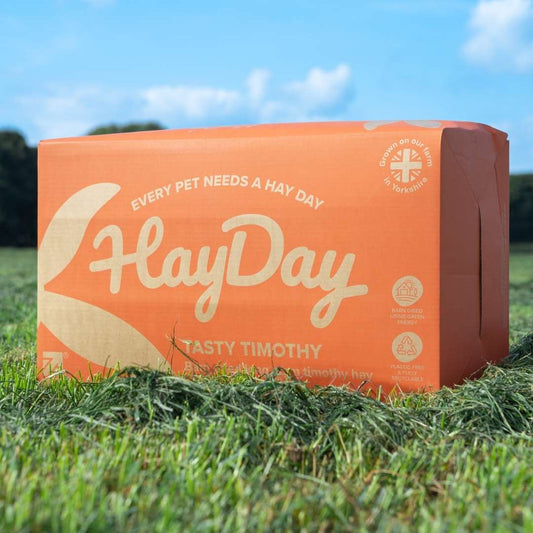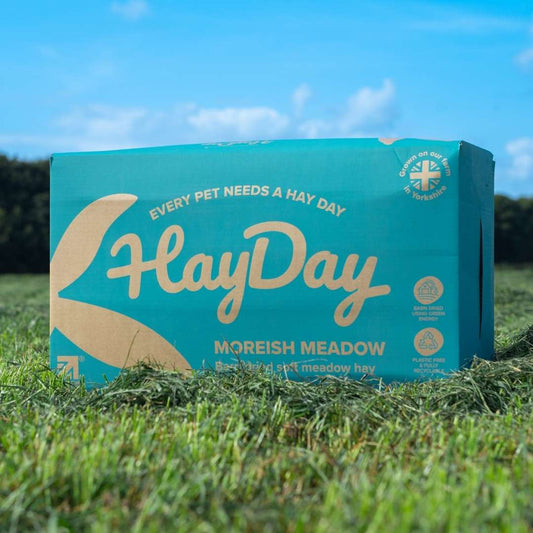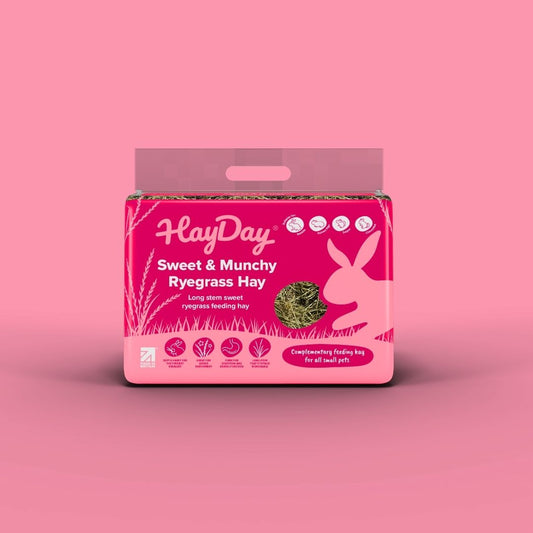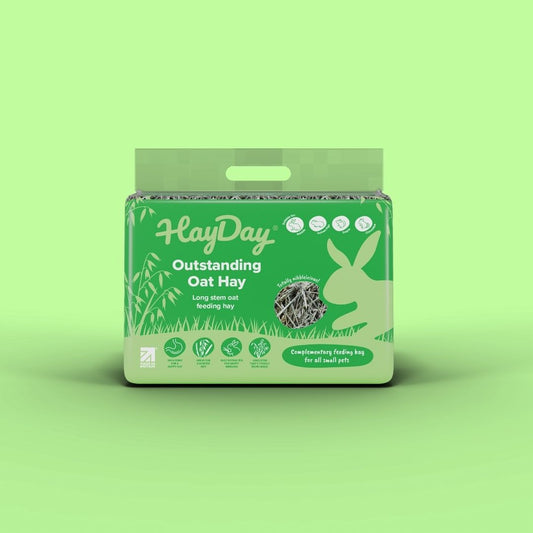Whether you buy hay as a one off purchase or subscribe to receive regular deliveries, how to store hay is often a question small pet owners wonder.
For some, a hay subscription is equivalent to scheduling your daily, weekly or monthly shop but for your rabbits, guinea pigs, degus and other small pets.
Others prefer to buy as and when it is needed - either way, whether you purchase one box or several, how to store your hay and having the best storage solution for it will preserve the quality for you and your pet.
Our Guide to Storing Hay at Home
We understand that storing hay for your small pets at home can be daunting for first time shoppers or even veterans in the small animal world.
But rest assured after reading our helpful guide, you will be equipped on the correct way to store your rabbit hay or guinea pig hay and will be quick to spot the signs which show that your hay may be spoiling and is no longer suitable to feed.

How To Keep Your Small Animal’s Hay Fresh
Luckily, when done correctly, hay is quite a sturdy product and keeping your small animals hay fresh is simple, once you know the correct way to do so.
There are three key tips when it comes to preserving your small animal’s hay which include;
- Storing hay in a dark, cool and well ventilated space
- Keeping hay at the correct temperature
- Allowing hay to breathe
Let’s break this down more…
Keep Hay In A Dark and Well Ventilated Space
The key to preserving your hay is storing it in the correct conditions. Similar to the way we keep our tinned food in date, hay must be kept in a dark and well ventilated room to avoid the hay from spoiling.
This prevents the sun from reaching it and ultimately bleaching or damaging it. Good places for this might be in the garage, in an outdoor shed, in a wheelie bin or large dustbin.
For some useful storage tips, see later in this guide.
Store Hay In A Cool and Dry Place for Freshness
The temperature of the room you store it in is super important too. We advise that hay is best kept at no warmer than room temperature. Think of this as being similar to Goldilock and the Three Bears: not too hot and not too cold, just right.
If you typically store your hay outdoors, we would always recommend regularly monitoring the weather. Any sudden changes can affect the quality of hay or in some cases could cause mould or mustiness. If it is hot, try and keep your hay in a cooler area and avoid sudden changes in temperature or intense sunlight.
Allow Hay To Breathe
Allowing your hay to breathe prevents any moisture from forming. Whether this is storing your small pet’s hay in its original packaging (our HayDay boxes are great for letting hay breathe). However, if your regular hay supply is kept in a plastic bag, we would recommend that you check your hay more regularly.
Buy Hay Dependent on Intake Volume
If you have limited storage solutions we recommend that you buy your hay according to how much your small pet eats! Our feeding guide, created by our in-house nutritionist Briony, is great at providing a guideline on how much hay your small pet should be eating on average. Hay should be offered at free choice to rabbits, guinea pigs, chinchillas and degus, however this will differ from small pet to small pet.
If you have the suitable storage space for more hay, you could benefit from a cost saving from buying more as our hay has a shelf life of 18 months if stored correctly!
If you are ever unsure of the nutritional requirements of your small pet you can always consult your vet or a nutritionist.
How To Spot If Your Hay Is Spoiling
As a natural product, certain conditions in the processing or storage can lead to spoilage. There are several signs that show if hay is spoiling, including;
- Spotting mould or smelling mould - Usually as a result of moisture
- Colour changes - Hay is a natural product so some colour changes are expected, especially getting lighter when exposed to light. However common signs of colour changes related to spoiling are dark patches that are also moist.
- Moisture - If hay is exposed to temperature changes and doesn’t have ventilation so cant breathe, this can lead to moisture in the product.
If you have any concerns or questions regarding your hay, you can contact a member of our team where we can advise you accordingly
Hay Storage Ideas
Here are our quick, easy and convenient hay storage solutions to keep your house tidy and to preserve your small pet’s hay.
Plastic Bins
Small animal owners are known to use bins to store their hay, in order to free up more space in their homes when buying hay in bulk. Whilst using a plastic bin is perfectly fine to store your hay, always remember that your hay needs to breathe!
We would suggest using bins or plastic boxes with small holes in them to prevent any moisture from affecting or spoiling your hay.
Keep It In Its Original Packaging
Our hay boxes are pretty convenient when thinking of storage solutions. Our 100% cardboard recyclable boxes are perfect to store your hay with ease as we designed them specifically to allow your hay to breathe. Simply re-seal the box after each use to preserve your hay supply. If your hay is currently purchased in plastic non-breathable packaging, you might want to open the pack and consider a storage solution (some plastic packaging does have ventilation holes).
Duvet Sheets
A fan favourite on social media! If you have any old duvet sheets, simply stuff your hay inside as a storage space. A great choice as it’s an efficient way to keep things tidy and allow for air to still get to your hay.
Just make sure you don’t mistake an old bed sheet for a newer and cleaner one - although we wouldn't blame you for using our hay as a duvet!
Consider A Hay Subscription
As a small pet owner, hay will be a number one household item on your shopping list. Well, perhaps it's time to consider a hay subscription (if you don’t already!)
With our door-to-door hay subscription, we remove the hassle for you! Save time, money and skip the forgetfulness of not remembering the hay - because hands up, who’s really done this?
If flexibility is what you need when it comes to storing your small pet’s hay, a subscription would be your go to. With the ability to simply pause, cancel, amend or divert your subscription to what is most convenient to you, it makes buying hay totally easy!
Our Hay box subscriptions allow you to decide whether you need a hay delivery every 2, 4, 8 or 12 weeks and with next day delivery using DPD, you’re never waiting too long.
You can manage your subscription anytime from your HayDay account or via any previous confirmation emails from us. Find out more about our hay subscription here.
Summary
It is essential to be digilent when it comes to checking for any signs of spoiling in your small animal’s hay, but by following our top tips and tricks on keeping your small animal’s hay fresh - we have you covered!
If stored correctly by the tips we’ve shared within this guide, our HayDay hay can be used for up to 18 months after purchase. You will always find best before dates on the packaging, which may differ from brand to brand.
Have you got a storage spot that we haven’t mentioned? Share it with us on social media or get in touch with our team!
Frequently Asked Questions
Which Animal’s Is Hay Suitable For?
Hay is suitable for a range of different livestock animals and small pets. HayDay caters for small animals which include rabbits, guinea pigs, chinchillas, gerbils and degus!
As small animals are herbivores, they rely on a high fibre diet in order to keep their complex bodies and digestive systems moving - not to mention it helps to maintain their ever-growing teeth. Hay should make up approximately 80-90% of their diet, and should be offered hay unlimited and at free choice.
You can see more here on feeding guidelines and small animal nutrition.
Timothy Hay or Meadow Hay For My Small Animal?
This will differ from small pet to small pet, as preference can be due to taste and the texture of the different grasses. Both are suitable for animals with a hay-based diet; such as rabbits, guinea pigs, chinchillas and degus. But, here’s what the experts at HayDay have found.
Tasty Timothy Hay is the golden poop maker in rabbits! Loved for its coarse stems and high protein and fibre content, this beautifully green box of timothy hay is consistently delicious each time for small pets everywhere!
Moreish Meadow Hay is barn dried and long stem meadow, grown on our farm in Yorkshire. It’s soft and palatable so not only is it great to nibble but our meadow hay also pairs as a comfy bed for rabbits and guinea pigs too!
Both of our hay boxes are long stem and high in fibre to aid your small pet’s overall health and digestive system.
Does Different Hay Have A Different Shelf Life?
Generally speaking, Timothy, Meadow and Alfalfa Hay will keep safe to feed for up to 18 months if stored correctly. Make sure to always store hay in a cool, dark, well ventilated space; which is out of direct sunlight.
Relevant Advice
The Benefits of Feeding Long Stem Hay
What You Need To Know About Our Hay Subscription
How To Encourage Your Small Animal To Forage: Nutritionist Top Tips





